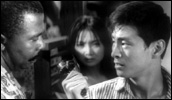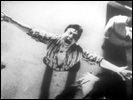The Warped Ones
- Year
- 1960
- Original title
- Kyonetsu no Kisetsu
- Japanese title
- 狂熱の季節
- Alternative title
- Season of Heat
- The Weird Lovemakers
- Director
- Cast
- Running time
- 75 minutes
- Published
- 22 September 2008


by Bryan Hartzheim
Koreyoshi Kurahara's Nikkatsu action piece starring jaded sexed-up Japanese youths doesn't have much muudo or akushon; rather, it is a wrecking ball to what can be considered the indulgences of the seishun eiga genre, an exhibition of the horrors of uninhibited youth taken to its carnal extremes and matched by a visual accompaniment akin to the abstract and improvised style of a Miles Davis score.
Compared by critics to more landmark youth rebellion films like Breathless or Rebel Without a Cause, The Warped Ones actually takes its frightening nihilists far more seriously and less sympathetically than its predecessors. It packs so much incident, character, melodrama, and visual panache into its short, 75-minute running time that even its American distributors were seemingly confused about how to market it considering its no fewer than three different titles: the more commonly known The Warped Ones; the original Weird Lovemakers at its initial release; and the literally translated Season of Heat.
A description of the story of The Warped Ones would make it seem more distracted and unoriginal than it really is. The film opens, much like Kinji Fukasaku's Street Mobster, to a swift musical score punctuating the violent movements of Akira (Kawachi), a local tough who has been arrested along with his accomplice and hooker friend Yuki (Chishiro) after attempting to rob a drunken foreigner at a Shibuya gaijin bar. While in prison, Akira befriends another hoodlum named Masaru (Go), and the three rendezvous upon their release through hotwiring cars and conning more foreigners for money. While still high on their new freedom, the three drive past a reporter who fingered them to the police in the bar. They run him over, abduct his artist fiancé Fumiko (Matsumoto), and take her to an abandoned beach, where Akira promptly rapes her to alternating scenes of Masaru and Yuki getting it on in the ocean.
After he's finished his business with Fumiko, Akira heads back to the usual spot at his local bar to fixate on jazz music. Tormented by her rape and claiming that she is carrying Akira's baby, Fumiko tracks down Akira at his bar begging for help, only to be rebuffed by his jazz-induced daze. The bulk of the rest of the film is a contrast between the sexual relationship between Masaru and Yuki, and the psychological ménage-a-trois between the traumatized Fumiko, her coward reporter fiancé, and the alternating sadism and indifference of the anti-hero Akira.
The plot, in other words, is sensationalist stuff, but is largely filtered through the lens of its disjointed protagonist. The filmmakers have a martinet confidence over the proceedings, but Akira Suzuki's frantic editing and DP Yoshio Mamiya's equally restless camera give the film its novel off-the-cuff quality; the two combine for rapid swish-pans, still frames, and jump cuts from one frenetic on-location scene to another, all under the steady employment of a handheld camera that is operated with disregard and yet total control. If this is supposed to be Tokyo, it's at times as unrecognizable as the dilapidated dwellings and raucous urban landscapes of any of your Kurosawas or Imamuras -- and as artfully rendered as well.
The Warped Ones takes the spirit of Nikkatsu's crime pictures and with it turns the seishun eiga on its head. This is ostensibly more of a youth film than a gangster film, but the youths are more sadistic than any of the gangsters, of whom we only see fleeting glimpses as they engage in what our protagonist deems uncivilized behavior (that would be gang violence instead of listening to jazz). The film begins with Akira and Masaru verbally castigating anyone that crosses their gnat-like attention spans. They speak to strangers and each other through grunts, cries, screams, catcalls, whistles, sound effects - in short, anything but words. This film in some ways resembles Band of Outsiders more than Breathless in the sense that these characters think they're the bad guys in a movie, and Masaru sings the driving soundtrack to their escapades. And there's fewer non-sequiturs.
The volatile Akira, inhabited completely by Kawachi's cat-like sense of superiority, is good-looking, tanned, and villainous, a delinquent who refuses to inhibit even his most criminal impulses. He rapes and robs to the tune of a swinging record in his head, but if you stop it, he goes berserk. If the world was a basketball court, Akira would be Ron Artest and the entire Bad Boys roster packed into the lean frame of a taiyozoku punk.
But Akira's mind does contain a certain insane logic, an absurd see-saw of menace and indifference magnified by his alienation. He views fighting as barbaric because it doesn't contribute anything to his sense of self - music, sex, and food are what fuel us as people, and however they can be got in the easiest way possible is life's fundamental purpose. Even here there are distinctions - Akira doesn't dig your muzak or lounge jazz. He knows the "good" jazz; it's hard, fast-driving, and full of a vitality missing from the enervated intellectuals and culture-mongers surrounding him. In one scene, Akira pushes aside two casual observers of a Pollack-like splatter painting, only to flip it upside down and declare, with a satisfactory grunt, that this is the real way to view the thing. In another scene, a bookish type attempts to extend his knowledge of the lower classes by analyzing Akira's character through phrenology, only to be interrupted by a bemused Akira billowing large puffs of smoke into his face. The Warped Ones beat Five Easy Pieces' excoriation of cold academics by several years through its brutal, if again easy and obvious, satire of ostentatious armchair critics.
Were the film just dropping us into the narcissism and impulsiveness of Akira's psychology, however, it would ultimately be a pretty meaningless, though harrowing, cinematic exercise. What Kurahara and screenwriter Nobuo Yamada bring to the table is a socio-political commentary visually describing some of the reasons why the Akiras and Yukis can and inevitably must exist in our society. The film unobstrusively glimpses Akira's creaky tenements, a sort of bizarro maze of connected wooden shacks and staircases nearly devoid of neighbors, created by a lack of the close human interest and community that populated the shantytowns of Sadao Yamanaka, e.g. Humanity and Paper Balloons. Trains run constantly in the background, providing residents a shared restlessness in the place of solace. The kids can't sleep because their parents, having shucked the responsibility of raising their children, would rather fornicate at any and all times of the day, undeterred when someone happens to inconveniently walk in on them. Without education, proper adult role models, or any moral codes, finding pleasure and money in easy hedonism is all too attractive.
These youngsters are depraved because the world around them is alternately sterile and relentless. But what makes the film ultimately somewhat tragic and poignant is that Akira and his friends seem to find something horribly wrong with this environment. Yuki and Masaru desperately want to start a family, even if it's through the wrong means. And Akira, for all his depravity, can only scream out his frustration at society's beaten-down poseurs and sadsacks in ineloquent yelps. It's no coincidence that Akira digs a type of jazz that no one else understands. Neither is it an accident that his best friend is a black foreigner by the name of Gill, a person it is implied he identifies with as being just as big a social outcast as himself. At one point, Akira becomes especially enraged, and his friend calms him down, takes him to the beach, and the overjoyed two swim out to sea, the sole scene in the film that indicates Akira is indeed capable of experiencing innocent pleasures and friendship, along with the potential for freedom from life's burdens.
But it doesn't last very long. Kurahara at this point in his career apparently didn't possess the same degree of sentimentality that pervades his later, family-oriented films. The irredeemable Warped Ones experience brief hopes that are all too quickly dashed by the harsh realities of the real world. If anything, the film's characters are less fully developed people than simple archetypal examples of human brutality in the very face of sentimentality. The only certainty in life is maliciousness, and to possess it is to not only survive, but thrive.